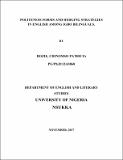JavaScript is disabled for your browser. Some features of this site may not work without it.
| dc.contributor.author | Dozie, Chinomso Patricia
|
|
| dc.date.accessioned | 2018-07-02T09:23:19Z | |
| dc.date.available | 2018-07-02T09:23:19Z | |
| dc.date.issued | 2017-11 | |
| dc.identifier.uri | http://repository.unn.edu.ng:8080/xmlui/handle/123456789/7121 | |
| dc.description.abstract | The objective of the study was to conduct a linguistic analysis of politeness and hedging strategies in the conversational English of Igbo bilinguals. Through a purposive sampling process, a total of 3000 copies of questionnaire in the form of a Discourse Completion Task – DCT were distributed to undergraduates of Igbo extraction at seven Universities systematically selected from the South-east and South-south geopolitical zones in Nigeria. In addition, 30 key persons participated in the in-depth interview study. Pretested and validated questionnaire written in English was administered to each respondent for the questionnaire – Discourse Completion Task DCT study. Questions were written to elicit any response on the guided options tagged A, B, C. In all, 2748 copies of questionnaire representing 92.00% were duly completed and returned. Results showed that Igbo bilinguals use politeness and hedging strategies very significantly in their English language conversation. Also, to fulfill a conversational demand, Igbo bilinguals adopt different politeness/hedging strategies given the discourse situation. Similarly, to satisfy the need for effective communication, these strategies adopted by this group of bilinguals in addition to enculturation and recourse to the nuances of the second language were clearly appropriate in discourse. Most importantly, Igbo bilinguals yielded to certain social factors such as hierarchy, power, age, rank, position, speaker-hearer relationships, and degree of impositions among others as they ultimately informed the use of a particular strategy or another. In general, females were found to be more linguistically polite than males. In conclusion, the findings of this study showed that politeness is a culture/context-bound phenomenon hence the theory of the universality of its expression or manifestation remains an illusion. | en_US |
| dc.language.iso | en | en_US |
| dc.subject | Igbo Bilinguals | en_US |
| dc.subject | Linguistics | en_US |
| dc.title | Politeness forms and Hedging Strategies in English among Igbo Bilinguals. | en_US |
| dc.type | Thesis | en_US |
